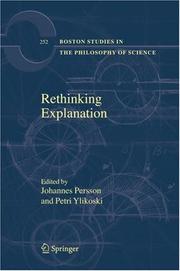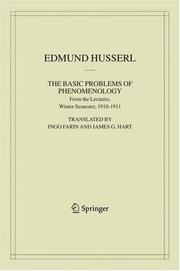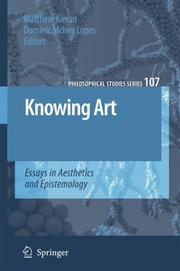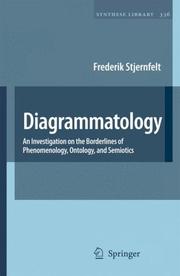| Listing 1 - 10 of 29 | << page >> |
Sort by
|
Book
ISBN: 9789048127221 9789048127214 Year: 2010 Publisher: Dordrecht Springer
Abstract | Keywords | Export | Availability | Bookmark
 Loading...
Loading...Choose an application
- Reference Manager
- EndNote
- RefWorks (Direct export to RefWorks)
Kant's "Critique of Pure Reason" is so outstanding among modern philosophical works, that it can be termed "the" foundation of modern philosophy. Schopenhauer termed it "the most important book ever to have been written in Europe." Otfried Höffe guides the reader through the "Critique" one step at a time, expounding Kant's thoughts, submitting them to an interpretation and drawing a summary conclusion, placing the work and its topics within the context of its modern successors. A "critical" interpretation of Kant's text reveals that he had something to say on many discussions that are said to have originated after his death. Reducing his argumentation to its central tenets, it can be made stronger and applicable to current problems. Kant's eventual concern, however, even when writing theoretical philosophy, lay with the practical. Elaborating this concern and its connection to Kant's theoretical philosophy is a prime tenet of this book.
Philosophy. --- History of Philosophy. --- Epistemology. --- Ethics. --- Philosophy (General). --- Genetic epistemology. --- Epistémologie génétique --- Morale --- Kant, Immanuel
Book
ISBN: 9789048133413 9789048133406 Year: 2009 Publisher: Dordrecht Springer Netherlands
Abstract | Keywords | Export | Availability | Bookmark
 Loading...
Loading...Choose an application
- Reference Manager
- EndNote
- RefWorks (Direct export to RefWorks)
Infinite regress arguments are part of a philosopher's tool kit of argumentation. But how sharp or strong is this tool? How effectively is it used? The typical presentation of infinite regress arguments throughout history is so succinct and has so many gaps that it is often unclear how an infinite regress is derived, and why an infinite regress is logically problematic, and as a result, it is often difficult to evaluate infinite regress arguments. These consequences of our customary way of using this tool indicate that there is a need for a theory to re-orient our practice. My general approach to contribute to such a theory, consists of collecting and evaluating as many infinite regress arguments as possible, comparing and contrasting many of the formal and non-formal properties, looking for recurring patterns, and identifying the properties that appeared essential to those patterns. Two very general questions guided this work: (1) How are infinite regresses generated in infinite regress arguments? (2) How do infinite regresses logically function as premises in an argument? In answering these questions I clarify the notion of an infinite regress; identify different logical forms of infinite regresses; describe different kinds of infinite regress arguments; distinguish the rhetoric from the logic in infinite regress arguments; and suggest ways of improving our discussion and our practice of constructing and evaluating these arguments.
Philosophy. --- Logic. --- Metaphysics. --- Epistemology. --- Philosophy of Religion. --- Philosophy (General). --- Genetic epistemology. --- Epistémologie génétique --- Logique --- Métaphysique --- Philosophie --- Infinite regress.
Book
ISBN: 9789048135288 9789048135295 Year: 2010 Volume: 46 Publisher: Dordrecht [etc.] Springer
Abstract | Keywords | Export | Availability | Bookmark
 Loading...
Loading...Choose an application
- Reference Manager
- EndNote
- RefWorks (Direct export to RefWorks)
Arturo Carsetti According to molecular Biology, true invariance (life) can exist only within the framework of ongoing autonomous morphogenesis and vice versa. With respect to this secret dialectics, life and cognition appear as indissolubly interlinked. In this sense, for instance, the inner articulation of conceptual spaces appears to be linked to an inner functional development based on a continuous activity of selection and anchorage realised on semantic grounds. It is the work of invention and g- eration (in invariance), linked with the rooting of meaning, which determines the evolution, the leaps and punctuated equilibria, the conditions related to the unfo- ing of new modalities of invariance, an invariance which is never simple repetition and which springs on each occasion through deep-level processes of renewal and recovery. The selection perpetrated by meaning reveals its autonomy aboveall in its underpinning, in an objective way, the ongoing choice of these new modalities. As such it is not, then, concerned only with the game of possibles , offering itself as a simple channel for pure chance, but with providing a channel for the articulation of the le in the humus of a semantic (and embodied) net in order to prepare the necessary conditionsfor a continuousrenewal and recoveryof original creativity. In effect, it is this autonomy in inventing new possible modules of incompressibility whichdeterminestheactualemergenceofnew(andtrue)creativity,whichalsotakes place through the narration of the effected construction.
Philosophy. --- Epistemology. --- Statistical Physics, Dynamical Systems and Complexity. --- Simulation and Modeling. --- Philosophy of Mind. --- Philosophy (General). --- Genetic epistemology. --- Philosophy of mind. --- Computer simulation. --- Epistémologie génétique --- Philosophie de l'esprit --- Simulation par ordinateur

ISBN: 9781402055812 1402055803 9781402055805 1402055811 1280865156 9786610865154 9400787081 Year: 2007 Volume: 252 Publisher: Dordrecht : Springer Netherlands : Imprint: Springer,
Abstract | Keywords | Export | Availability | Bookmark
 Loading...
Loading...Choose an application
- Reference Manager
- EndNote
- RefWorks (Direct export to RefWorks)
The nature of scientific explanation has been an important topic in philosophy of science for many years. This book highlights some of the conceptual problems that still need to be solved and points out a number of fresh philosophical ideas to explore. Anyone interested in causal and probabilistic explanation, explanation-seeking questions and contrastive explanations, inference to the best explanation, or explanations within the special sciences should find something of interest in this book.
epistomologie --- epistemologists --- Philosophy of science --- Theory of knowledge --- kennisleer --- Pure sciences. Natural sciences (general) --- Explanation. --- Science --- Philosophy. --- Normal science --- Explanation (Philosophy) --- Knowledge, Theory of --- Verklaring. --- Genetic epistemology. --- Philosophy of Science. --- Epistemology. --- Developmental psychology --- Philosophy and science. --- Epistemology --- Philosophy --- Psychology --- Science and philosophy --- Explanation

ISBN: 1402037872 9781402037870 1402037899 9781402037894 1280624493 9786610624492 1402037880 Year: 2006 Volume: 12 Publisher: Dordrecht Springer
Abstract | Keywords | Export | Availability | Bookmark
 Loading...
Loading...Choose an application
- Reference Manager
- EndNote
- RefWorks (Direct export to RefWorks)
Observes that in his ""Nachlass"", Husserl probably refers to ""The Basic Problems of Phenomenology (1910-1911)"". This book reveals Husserl in a critical dialogue with himself. It states that the second part of the lectures was never written down, because at that time Husserl was busy writing the 1911 essay ""Philosophy as a Rigorous Science.""
Theory of knowledge --- Phenomenology --- Philosophy, Modern --- Phenomenology. --- Philosophy, Modern. --- Modern philosophy --- Husserl, Edmund, --- Addresses, essays, lectures --- Phenomenology . --- Philosophy of mind. --- Genetic epistemology. --- Ontology. --- Philosophy of Mind. --- Epistemology. --- Being --- Philosophy --- Metaphysics --- Necessity (Philosophy) --- Substance (Philosophy) --- Developmental psychology --- Knowledge, Theory of --- Mind, Philosophy of --- Mind, Theory of --- Theory of mind --- Cognitive science --- Philosophical anthropology --- Epistemology --- Psychology

ISBN: 9781402052651 1402052642 9781402052644 1402052650 1280902590 9786610902590 1402067852 Year: 2007 Publisher: Dordrecht : Springer Netherlands : Imprint: Springer,
Abstract | Keywords | Export | Availability | Bookmark
 Loading...
Loading...Choose an application
- Reference Manager
- EndNote
- RefWorks (Direct export to RefWorks)
Artworks potentially convey two kinds of knowledge. They obviously afford knowledge of art itself, and they also afford general empirical knowledge, especially knowledge of human psychology and value. Knowing Art collects ten original essays written by leading philosophers who distill and build upon recent work at the intersection of aesthetics and epistemology. Specific topics addressed include the objectivity of critical knowledge, the quality of critical testimony, the roles of principles and perception in critical reasoning, phenomenal knowledge of what a work of art is like, the acquisition of factual information and psychological understanding from fictions, and the limits of images as sources of historical evidence. In addressing these topics, the volume also explores the challenges that art poses for theories of knowledge as well as the challenges that artistic knowledge poses to traditional views about art.
ethiek --- Theory of knowledge --- kennisleer --- kunst --- epistomologie --- General ethics --- Aesthetics --- esthetica --- epistemologists --- Art --- aesthetics --- Aesthetics. --- Knowledge, Theory of. --- Beautiful, The --- Beauty --- Esthetics --- Taste (Aesthetics) --- Philosophy --- Criticism --- Literature --- Proportion --- Symmetry --- Psychology --- Knowledge, Theory of --- Epistemology --- Genetic epistemology. --- Ethics. --- Arts. --- Epistemology. --- Arts, Fine --- Arts, Occidental --- Arts, Western --- Fine arts --- Humanities --- Deontology --- Ethics, Primitive --- Ethology --- Moral philosophy --- Morality --- Morals --- Philosophy, Moral --- Science, Moral --- Values --- Developmental psychology --- Arts, Primitive --- Radio broadcasting Aesthetics
Book
ISBN: 9789048132515 9789048132522 9789048132539 9789400791503 9048132517 940079150X 9786612924323 128292432X 9048132525 Year: 2010 Publisher: Dordrecht : Springer Netherlands : Imprint: Springer,
Abstract | Keywords | Export | Availability | Bookmark
 Loading...
Loading...Choose an application
- Reference Manager
- EndNote
- RefWorks (Direct export to RefWorks)
These volumes collect a selection of papers presented at the Founding Conference of the European Philosophy of Science Association meeting in Madrid. The volumes provide an excellent overview of the state of the art in philosophy of science as practised nowadays in different European countries.
Philosophy of science --- Science --- Methodology --- Philosophy --- Social sciences --- Biology-Philosophy. --- Genetic epistemology. --- Logic. --- Philosophy of Science. --- Philosophy of the Social Sciences. --- Philosophy of Biology. --- Epistemology. --- Philosophy. --- Normal science --- Argumentation --- Deduction (Logic) --- Deductive logic --- Dialectic (Logic) --- Logic, Deductive --- Intellect --- Psychology --- Reasoning --- Thought and thinking --- Developmental psychology --- Knowledge, Theory of --- Social philosophy --- Social theory --- Philosophy and science. --- Philosophy and social sciences. --- Biology—Philosophy. --- Epistemology --- Theory of knowledge --- Social sciences and philosophy --- Science and philosophy
Book
ISBN: 9788847008168 8847008166 9788847008175 9786612068546 1282068547 8847008174 Year: 2008 Publisher: Milano : Springer Milan : Imprint: Springer,
Abstract | Keywords | Export | Availability | Bookmark
 Loading...
Loading...Choose an application
- Reference Manager
- EndNote
- RefWorks (Direct export to RefWorks)
Il dado, il filo, la chiave, l’anello, lo specchio, il bottone e la sfera sono cose semplici che incontriamo quotidianamente, ma di cui spesso ci dimentichiamo, perché la cultura contemporanea sempre più si lascia ammaliare dalla complessità dei sistemi e dalla leggerezza delle realtà virtuali. Questo saggio, facendo il controcanto alle cinque Lezioni americane di Italo Calvino, esamina come le "cose semplici" di fatto spesso dimostrino la loro importanza nella semplicità, nella lentezza, nella pesantezza, nella singolarità, nella stessa invisibilità. Ma la loro "consistenza" – questa appunto avrebbe dovuto essere la sesta Lezione – risiede appunto nel fatto che la loro forza, simbolica e reale sta proprio nel fatto che sono cose concrete, che tutti possiamo toccare, anche quando assumono un significato metaforico. I sette oggetti semplici avrebbero potuto essere accompagnati da molti altri esemplari, ma questo libro deve rimanere soprattutto uno stimolo affinché si possa ricuperare una maggiore attenzione alla concretezza delle cose, che non è solo importante quando sono riposte nelle vetrine di un museo di cultura materiale, ma perché sono parte di noi. Letteratura e tecnica, arte e filosofia, musica e cronaca, ogni giorno dimostrano come queste "cose" siano le vere protagoniste di quella che i francesi chiamano civilization: l’Anello del Nibelungo, il Bottone di Pushkin, e il "dado brunelleschiano" sono soltanto alcuni esempi di come queste "cose" abbiano trovato un posto d’onore nella storia. E questo è un libro in cui si raccontano tante storie, come le fiabe che introducono le nostre cose, per farci entrare nel loro mondo accompagnati dalla fantasia.
Science --- Sciences --- History --- Histoire --- Science -- History. --- History & Archaeology --- Physical Sciences & Mathematics --- History - General --- Sciences - General --- Natural history. --- History. --- History, Natural --- Natural science --- Physiophilosophy --- Epistemology. --- Philosophy. --- Applied linguistics. --- Popular works. --- History of Science. --- Philosophy of Technology. --- Applied Linguistics. --- Popular Science, general. --- Biology --- Genetic epistemology. --- Science (General). --- Developmental psychology --- Knowledge, Theory of --- Linguistics --- Mental philosophy --- Humanities --- Annals --- Auxiliary sciences of history --- Epistemology --- Theory of knowledge --- Philosophy --- Psychology

ISBN: 9781402056529 9789400705319 9781402056512 Year: 2007 Publisher: Dordrecht Springer
Abstract | Keywords | Export | Availability | Bookmark
 Loading...
Loading...Choose an application
- Reference Manager
- EndNote
- RefWorks (Direct export to RefWorks)
Diagrammatology investigates the role of diagrams for thought and knowledge. Based on the general doctrine of diagrams in Charles Peirce's mature work, Diagrammatology claims diagrams to constitute a centerpiece of epistemology. The book reflects Peirce's work on the issue in Husserl's contemporanous doctrine of "categorial intuition" and charts the many unnoticed similarities between Peircean semiotics and early Husserlian phenomenology. Diagrams, on a Peircean account, allow for observation and experimentation with ideal structures and objects and thus furnish the access to the synthetic a priori of the regional and formal ontology of the Husserlian tradition. The second part of the book focusses on three regional branches of semiotics: biosemiotics, picture analysis, and the theory of literature. Based on diagrammatology, these domains appear as accessible for a diagrammatological approach which leaves the traditional relativism and culturalism of semiotics behind and hence constitutes a realist semiotics Diagrams will never be the same. A fascinating and challenging tour through phenomenology, biology, Peirce's theory of signs and Ingarden's ontology of literature, all neatly tied together through the guiding thread of the diagrammatical. A veritable tour de force. Barry Smith, SUNY at Buffalo, U.S.A. With his meticulous scholarship, Frederik Stjernfelt shows that Peirce and Husserl were cultivating a broad and fertile common ground, which was largely neglected by both the analytic and the continental philosophers during the 20th century and which promises to be an exciting area of research in the 21st. John F. Sowa, Croton-on-Hudson, U.S.A.
philosophy --- kennisleer --- ontologie --- Comparative literature --- existentialisme --- Theory of knowledge --- Biological anthropology. Palaeoanthropology --- Metaphysics --- epistomologie --- biology --- Semiotics --- pragmatisme --- epistemology --- biologie --- ontology [metaphysics] --- epistemologists --- filosofie
Book
ISBN: 9781402098963 9781402099366 9789401781329 9781402098956 1402098952 940178132X 9786612982408 1402098960 1282982400 Year: 2010 Publisher: Dordrecht [etc.] Springer
Abstract | Keywords | Export | Availability | Bookmark
 Loading...
Loading...Choose an application
- Reference Manager
- EndNote
- RefWorks (Direct export to RefWorks)
by the Academies of the two countries – to the Italian-Swiss University of Lugano for the two-day-Symposium. The question of the meaning of “truth” is central to many areas of contemporary debate, whether between those subscribing to a post-Enlightenment view of the world and those who seek fundamental truth in religious texts, or between those maintaining that there are absolute truths and those believing facts to be social constructs. For some, the ultimate truth is revealed through religious faith and t- tual authority. Can this view be reconciled with an evidence-based, materialist, post-Enlightenment perspective of the truth as embraced by the natural sciences? If religion holds the key to the truth, which religion and which truths? During the five thematic sessions of the symposium, all attended by the same audience and by all the speakers and panel members, these and many other qu- tions, but in particular the one about the meaning of truth, were examined and debated. The whole range of perspectives represented on the panels and in the au- ence came to the fore. After the keynote lecture by Professor Simon Blackburn, the five sessions covered the following disciplines: philosophy, mathematics, physics, cosmology, the biological sciences including biodiversity and sustainability, h- tory, the social sciences, theology and religion. This volume contains the speakers’ lectures, the corresponding reactions of the invited panel members as well as the panel and general discussions of the two-d- symposium.
Theory of knowledge --- Philosophy of science --- Religious studies --- wetenschapsfilosofie --- godsdienstfilosofie --- kennisleer --- Truth --- Geisteswissenschaften. --- Religion. --- Wissenschaftsphilosophie. --- Wahrheit. --- Naturwissenschaften. --- Lugano <2008> --- EPUB-LIV-FT LIVHUMAI SPRINGER-B --- Philosophy and science. --- Religion—Philosophy. --- Epistemology. --- Philosophy of Science. --- Philosophy of Religion. --- Epistemology --- Philosophy --- Psychology --- Science and philosophy --- Science --- Truth - Congresses
| Listing 1 - 10 of 29 | << page >> |
Sort by
|

 Search
Search Feedback
Feedback About
About Help
Help News
News